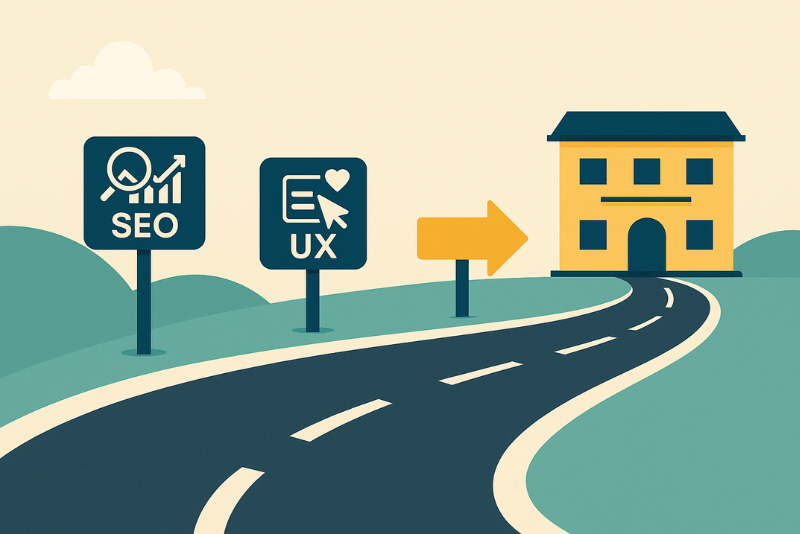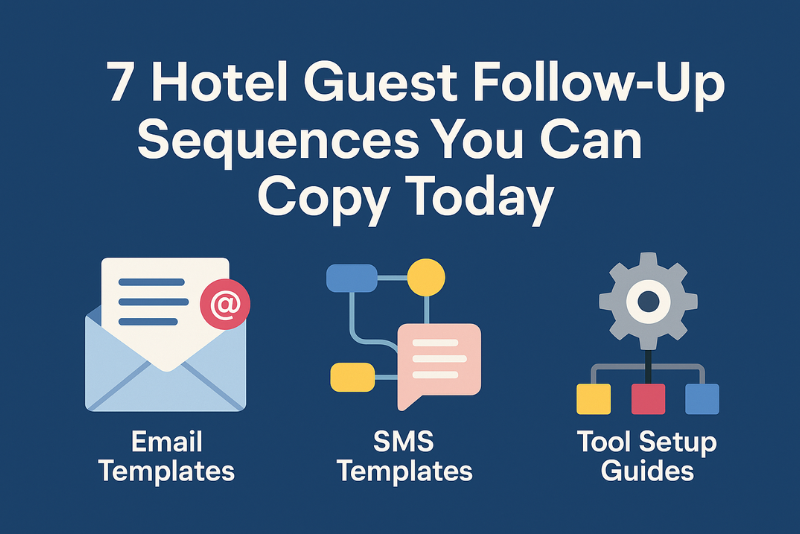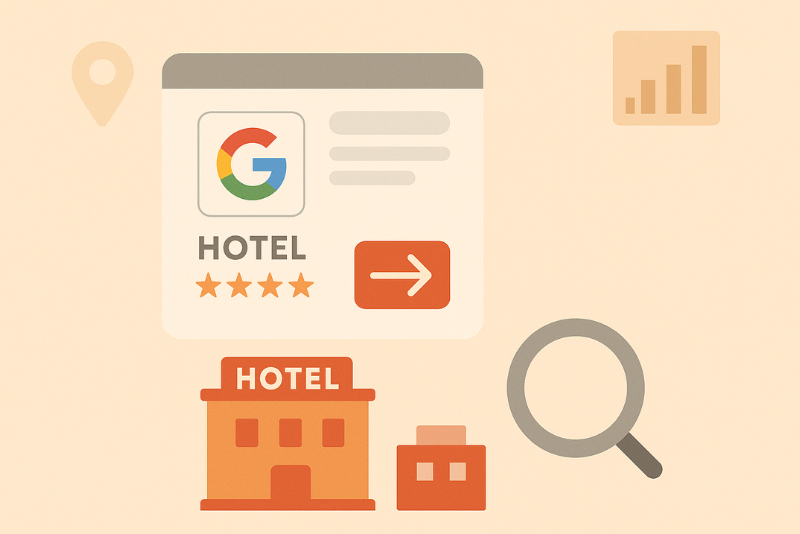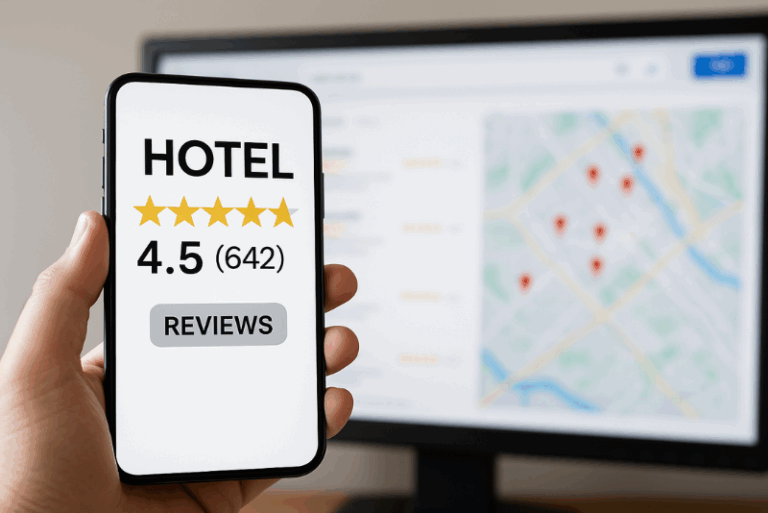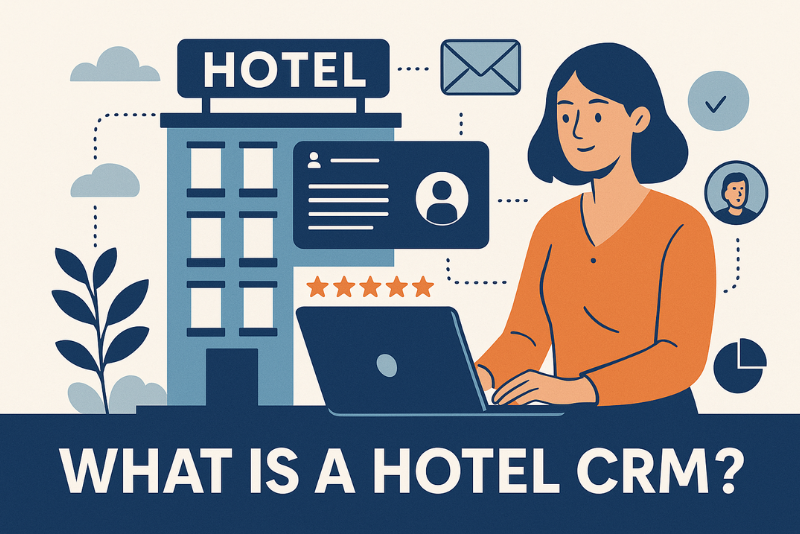Optimizing Your Hotel Direct Booking Website for SEO & UX
Turn traffic into revenue by balancing visibility, simplicity, and strategic design with your hotel direct booking website.
You’ve invested time, money, and energy in your property, but your website is just as crucial as your guest experience.
If you’re not converting traffic into guest nights, you’re literally handing profits to the OTAs. They take a cut, own the guest data, and leave you competing on price. When your website generates direct bookings, you maintain control over your brand, guest relationships, and your revenue.
Here’s the problem: most hotel websites are built to look impressive, not to sell.
Pretty doesn’t mean profitable.
Your website is the sales hub for your brand and is essential for standing out and maximizing direct bookings and revenue. A high-performing website does four things well: it attracts the right people, builds trust, simplifies decision-making, and converts interest into action.
That doesn’t happen by accident — it’s the result of aligning search engine optimization (SEO) with user experience (UX).
This guide walks you through how to make your website the cornerstone to more bookings.
TL;DR Summary:
- Direct bookings are more profitable than OTA referrals — but most hotel websites fail to convert.
- SEO and UX are not separate tactics. They must be aligned to attract and convert the right audience.
- Define your website’s core purpose: fast bookings or lead generation.
- Reduce decision friction: fewer options, clear CTAs, strong trust signals.
- Implement, monitor, and iterate.
The Booking Battleground: Why Your Website Is Your Most Valuable Asset

Your website should be your highest-margin booking channel. Yet for many hotels, it’s an afterthought — a passive portfolio instead of a proactive sales tool.
It’s a missed opportunity: interested travelers and potential guests who find you online and visit your webpage are warm leads.
If your site doesn’t guide them clearly and confidently to book or inquire, that interest goes cold — and often straight to a competitor.
To outperform, your site must:
- Appear where and when your ideal guests are searching (SEO)
- Convert their interest into action with minimal friction (UX)
It’s crucial to focus on converting customers and potential guests who land on your site into direct bookings.
First Click, First Impression: How SEO and UX Work Together to Win or Lose the Booking

Google rewards websites that load fast, load quickly, serve mobile users well, and keep visitors engaged.
That’s not just good SEO — that’s good UX.
Once a visitor lands on your site, they make judgments quickly. In five seconds, they should understand:
- What makes your property special
- Why booking direct matters
- How to take action next
This is where most hotel sites fail. They offer too many choices, too much content, and no clear direction. Simplicity isn’t minimalism — it’s focus.
Above-the-fold must-haves:
- A headline that articulates your unique value
- A visible call-to-action (“Check Availability”, “Book Direct & Save”)
- One strong hero image that matches your offering
- Trust indicators: star ratings, reviews, or safety badges
For example, A homepage with rotating carousels, five CTAs, and no visible rates forces users to hunt. In contrast, a page with one bold image, a single CTA, and visible pricing tells users exactly what to do — and why.
Design With Purpose: Are You Selling a Stay or Starting a Conversation?

Every hotel website should have a conversion goal. But that goal depends on your business model.
Here are two common paths:
- Booking Engine Model: Ideal for city hotels or short-stay properties where guests make quick decisions. This model uses a direct booking engine that enables fast, transactional bookings directly on your website.
- Conversation Model: Ideal for higher-ticket sales, such as resorts, retreats, weddings, and extended stays, where custom packages or personal contact are crucial. The goal of this model is for a customer to express interest and start a conversation.
Trying to do both often creates confusion. If your website doesn’t make it clear whether the guest should book or inquire, they’ll usually do neither.
For booking engine models:
- Keep the journey short and familiar
- Emphasize available rooms, rates, and urgency
For conversation models:
- Lead with lifestyle imagery and experience-driven copy
- Use inquiry forms, virtual tours, or quote builders instead of “Book Now”
Tip: Don’t funnel group events, weddings, and multi-room bookings through a generic booking engine. Instead, invite the guest into a guided inquiry process.
Booking Flow: Turn Interest Into Action Without Friction

Friction isn’t just about load speed — it’s about mental effort.
Whether you use a booking engine or inquiry model, the path to action must feel easy, obvious, and safe. The booking flow should make it simple for guests to complete their reservations and payments.
Key elements:
- Clear progress indicators
- Visible pricing and availability
- Simplified forms with minimal required fields
- Ability to accept payments securely and manage reservations efficiently
- Reassurance: cancellation policies, secure payment icons, the ease of confirming a reservation, and response time expectations
Don’t make users guess what happens next. Every interaction should build confidence, not raise questions.
SEO Foundation: Be Visible to the Right Guests, For the Right Reasons
Start with guest intent and your target audience:
- Are they looking for a weekend escape or planning a corporate retreat?
- Are they searching “boutique hotel in Napa” or “romantic getaway California”?
- What are the preferences and needs of your target audience, and how can your website address them?
Your SEO should match your offering, align with real booking behavior, and be tailored to your target audience.
Essentials:
- Optimized titles and meta descriptions that include location and value
- Header structure that guides readers and search engines
- Internal links that push users toward conversion paths
- Schema markup for property type, amenities, and availability
- Creating SEO-optimized content that addresses the needs and interests of your target audience
Forget vanity traffic. You want bookable traffic.
Use SEO to promote your hotel’s direct booking website across various platforms, ensuring your property is visible on all relevant online booking channels and systems.
Local SEO: Win High-Intent Traffic From Nearby and Last-Minute Searches
Guests who search “hotel near me” are close to booking — often same-day.
Make sure your hotel shows up when and where they need you:
- Complete your Google Business Profile with updated hours, amenities, and high-quality photos.
- Consistently use your company name, address, and phone (NAP) across listings to reinforce your business identity.
- Gather and respond to guest reviews regularly.
- Create unique, location-optimized landing pages that reflect your company’s branding and information, and speak to local demand.
Local SEO isn’t just for map rankings. It’s one of the most profitable guest acquisition channels available.
UX Signals That Build Trust and Support Search Rankings
User signals — like time on site and bounce rate — now directly influence your search visibility.
To perform well in both Google and guest perception:
- Ensure your site is fast, especially on mobile
- Use legible fonts and intuitive navigation menus
- Show proof of guest satisfaction: testimonials, star ratings, press coverage
- Make contact options and policies visible on every page
- Maintain consistent branding across your website to build trust and present a professional appearance
- Clearly present available services that help guests make informed decisions
Confidence drives action. Guests don’t book when they feel unsure.
Guest engagement features, such as live chat or personalized recommendations, are also crucial for building trust, improving guest loyalty, and encouraging repeat bookings.
Conversion Boosters That Don’t Overwhelm the Guest
Too many options lead to indecision.
Instead of showing every room, package, or add-on, curate your offerings:
- Highlight 2–4 best-sellers or most-booked rooms
- Highlight special offers, exclusive discounts, and targeted promotions available only through direct bookings
- Use urgency only when it’s authentic: “Last Room for This Weekend”
- Personalize when possible (geo-targeted offers, returning visitor greetings)
- A/B test your hero image, CTA language, and form layout
A streamlined experience leads to stronger conversions: less guessing, more booking.
Homepage Performance
Want to know how well your homepage performs? Score it in five key areas:
- Clarity: Is it obvious what you offer and why it matters?
- Booking Path: Is the action clear, visible, and mobile-friendly?
- Speed: Does your homepage load in under 3 seconds?
- Trust: Are reviews, contact info, and policies easy to find?
- Focus: Is the design guiding the eye or distracting the visitor?
Improving your homepage can help reduce costs associated with third-party booking platforms and advertising, making your hotel more profitable by driving more direct bookings and lowering overall cost per acquisition.
Final Word: Simplify, Align, and Iterate to Outperform the Competition
The most effective hotel websites aren’t the flashiest — they’re the clearest.
They know what they’re trying to do, and they help the guest do it.
Start with clarity, build trust, and continuously improve based on what your guests actually do. Because the hotel that iterates, wins in rankings, in revenue, and in relationships.
FAQ
What is the best way to increase direct hotel bookings online?
Focus on ads or SEO to bring in targeted traffic, and UX to convert that traffic. Prioritize simplicity, mobile usability, trust signals, and a clear path to booking.
Should my hotel website use a booking engine or an inquiry form?
It depends on your business model. Use a direct booking engine to enable guests to reserve instantly and securely. Use inquiry forms for group bookings, events, or tailored experiences.
How does SEO impact hotel website conversions?
Good SEO drives the right visitors to your site, but conversion depends on UX and how well your guests interact with your site.
How often should I update or test my hotel website?
This depends on your time and budget. Think of your site as a rough draft that you are continuously trying to improve and polish over time.
What is the ideal number of room options to show on my website?
Limit it to 2–4 clearly differentiated options.

